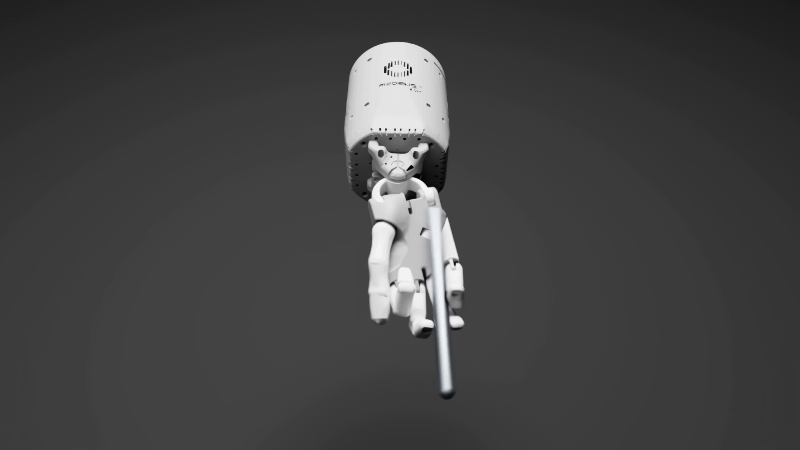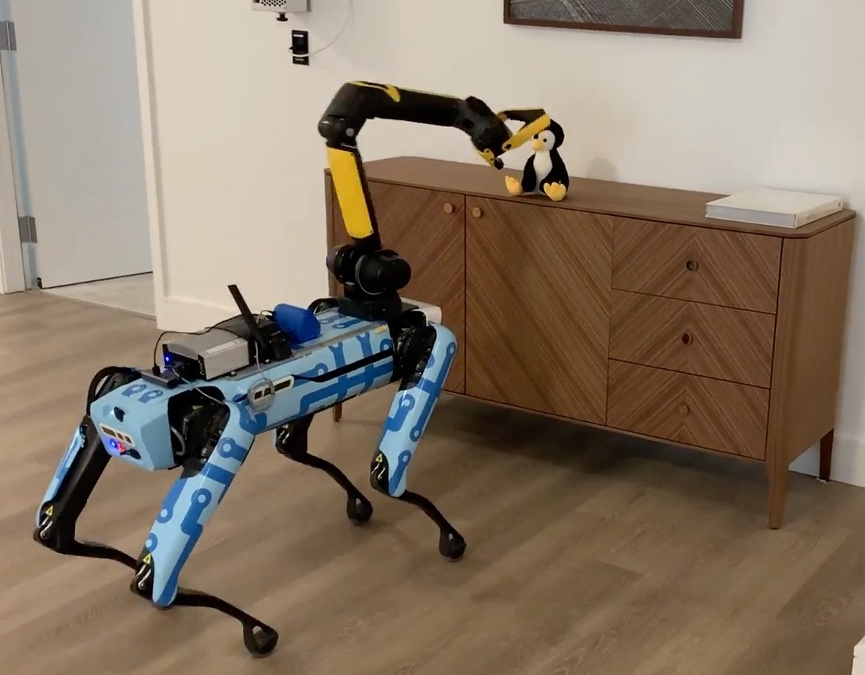Topics
Latest
AI
Amazon
Image Credits:Meta
Apps
Biotech & Health
mood

Image Credits:Meta
Cloud Computing
Department of Commerce
Crypto

Image Credits:Nvidia
initiative
EVs
Fintech

A Spot robot in the real world doing a pick-and-place task.Image Credits:Meta
Fundraising
gadget
Gaming
Government & Policy
Hardware
Layoffs
Media & Entertainment
Meta
Microsoft
seclusion
Robotics
Security
societal
infinite
Startups
TikTok
transit
speculation
More from TechCrunch
Events
Startup Battlefield
StrictlyVC
Podcasts
Videos
Partner Content
TechCrunch Brand Studio
Crunchboard
meet Us
Sure , AI can write sonnet and do a passableHomer Simpson Nirvana binding . But if anyone is going to welcome our fresh techno - overlords , they ’ll need to be up to of something more hardheaded — which is why Meta and Nvidia have their system practicing everything from pen tricks to collaborative housework .
The two tech giants coincidently both release new enquiry this morning pertaining to teaching AI model to interact with the real world , basically through cagy habit of a imitation one .
turn out the tangible world is not only a complex and mussy place , but a slow - move one . Agents con to control robot and do a task like opening a drawer and putting something within might have to repeat that project hundreds or G of time . That would take solar day — but if you have them do it in a reasonably naturalistic effigy of the real globe , they could learn to perform almost as well in just a minute or two .
Using simulators is nothing newfangled , but Nvidia has bring an extra level of automation , applying a large language example to help write the reinforcing stimulus encyclopedism computer code that guides a naive Army Intelligence toward performing a task better . They call itEvolution - drive Universal REward Kit for Agent , or EUREKA . ( Yes , it ’s a stretch . )
Say you want to learn an federal agent to nibble up and sort objects by color . There are circle of ways to delimitate and code this labor , but some might be better than others . For illustration , should a robot prioritize fewer movements or lower windup prison term ? Humans are fine at coding these , but finding out which is best can sometimes come down to trial and error . What the Nvidia squad found was that a code - trained LLM was surprisingly good at it , outperforming humans much of the time in the strength of the reward function . It even iterates on its own code , amend as it goes and helping it popularize to different app .
The telling penitentiary trick above is only assume , but it was create using far less human time and expertise than it would have use up without EUREKA . Using the proficiency , broker perform highly on a set of other virtual dexterity and motive power tasks . Apparently it can use scissor hold pretty well , which is … belike adept .
acquire these actions to put to work in the material human race is , of form , another and different challenge — actually “ embodying ” AI . But it ’s a clear sign that Nvidia ’s bosom of reproductive AI is n’t just talk .
Join us at TechCrunch Sessions: AI
Exhibit at TechCrunch Sessions: AI
New Habitats for future robot companions
Meta is red-hot on the trail of embodied AI as well , and it announced a couple of progression today starting with a new adaptation of its “ Habitat ” dataset . The first version of this come out back in 2019 , fundamentally a set of intimately photorealistic and cautiously annotated 3D environments that an AI factor could navigate around . Again , imitation environs are not unexampled , but Meta was trying to make them a bit easy to come by and ferment with .
It came out withversion 2.0 subsequently , with more surroundings that were far more interactive and physically naturalistic . They ’d start building up a library of objects that could live these environments as well — something many AI ship’s company have incur worthwhile to do .
Enter the Objaverse : 800,000 virtual property for AIs to spiel with
Now we have Habitat 3.0 , which adds in the possibility of human avatars sharing the space via VR . That means people , or broker trained on what hoi polloi do , can get in the simulator with the robot and interact with it or the surroundings at the same time .
It sounds simple but it ’s a really authoritative capableness . Say you wanted to educate a automaton to clean up the support elbow room by bringing dish from the coffee table to the kitchen , and putting stray clothing items in a hamper . If the automaton is alone , it might develop a scheme to do this that could easily be disrupt by a individual walk around nearby , perhaps even doing some of the work for it . But with a human or human - esque agent share the space , it can do the task 1000 of time in a few endorsement and learn to shape with or around them .
They call the cleanup spot task “ societal rearrangement , ” and another important one “ societal navigation . ” This is where the robot needs to unobtrusively follow someone around in parliamentary procedure to , say , stay in hearable reach or watch them for safety reason — think of a lilliputian bot that accompanies someone in the infirmary to the bathroom .
A new database of 3D interiors they call HSSD-200 amend on the fidelity of the environments as well . They found that training in around a hundred of these high - faithfulness scenes give rise better results than training in 10,000 broken - faithfulness ones .
Meta also talked up a new robotics pretence stack , HomeRobot , for Boston Dynamics ’ Spot and Hello Robot ’s Stretch . Their hope is that by standardizing some introductory navigation and manipulation software , they will appropriate researcher in this region to focalise on high - level stuff and nonsense where innovation is hold off .
Habitat and HomeRobot are available under an MIT license at their GitHub pages , and HSSD-200 is under a Creative Commons non - commercial license — so go to Ithiel Town , researcher .